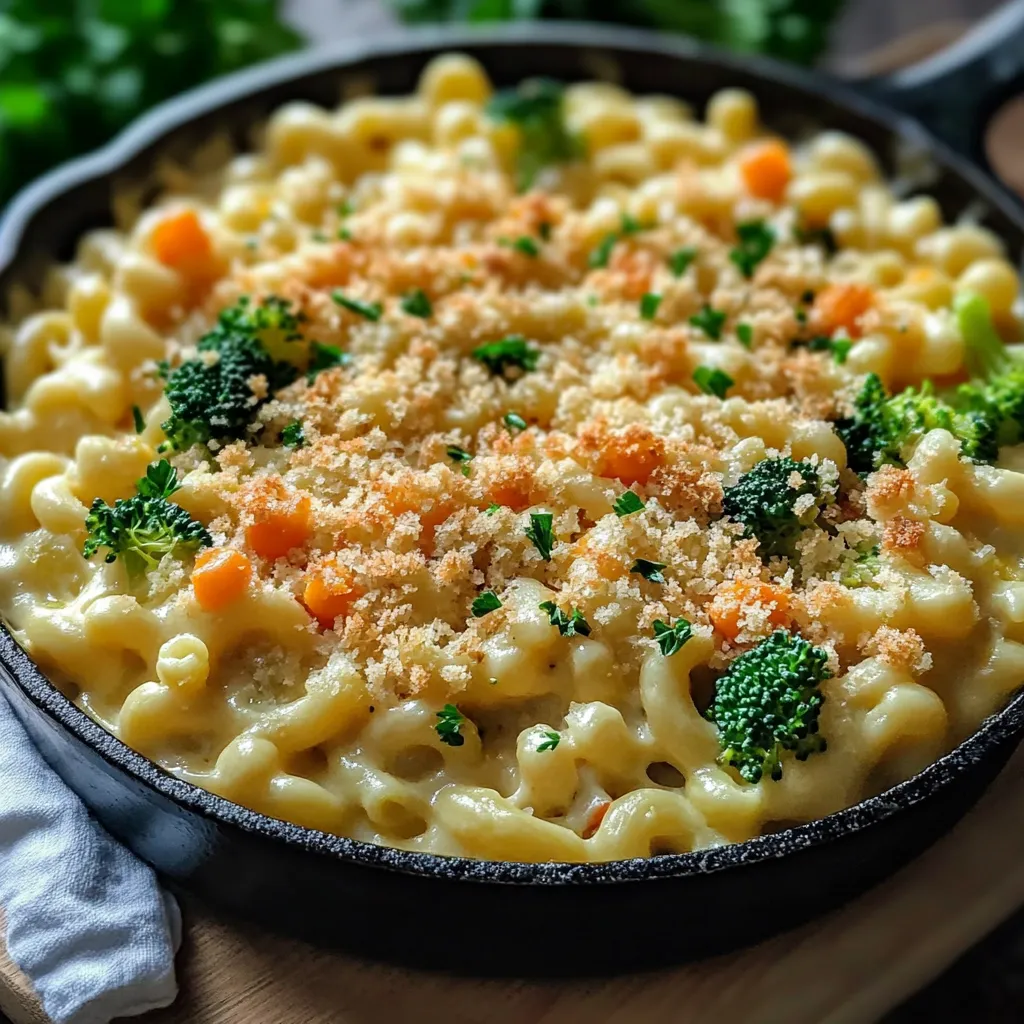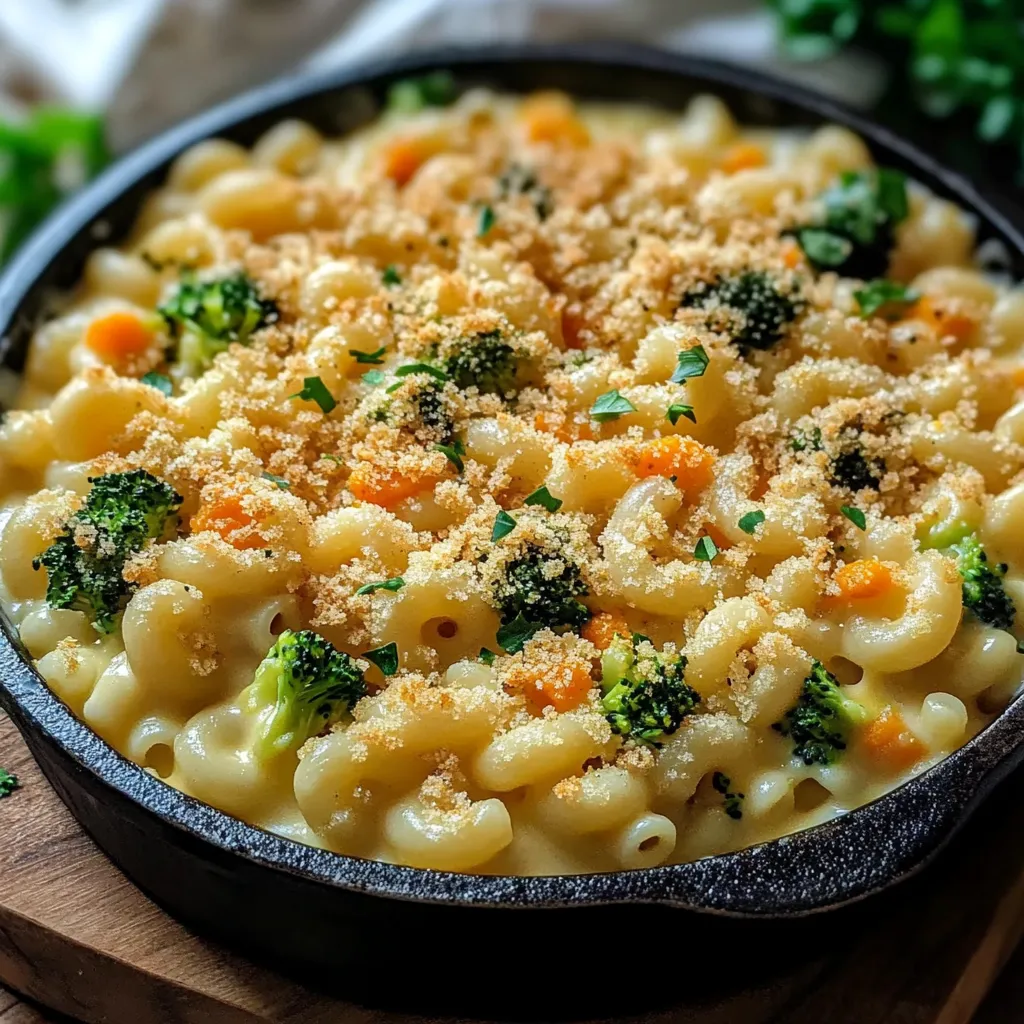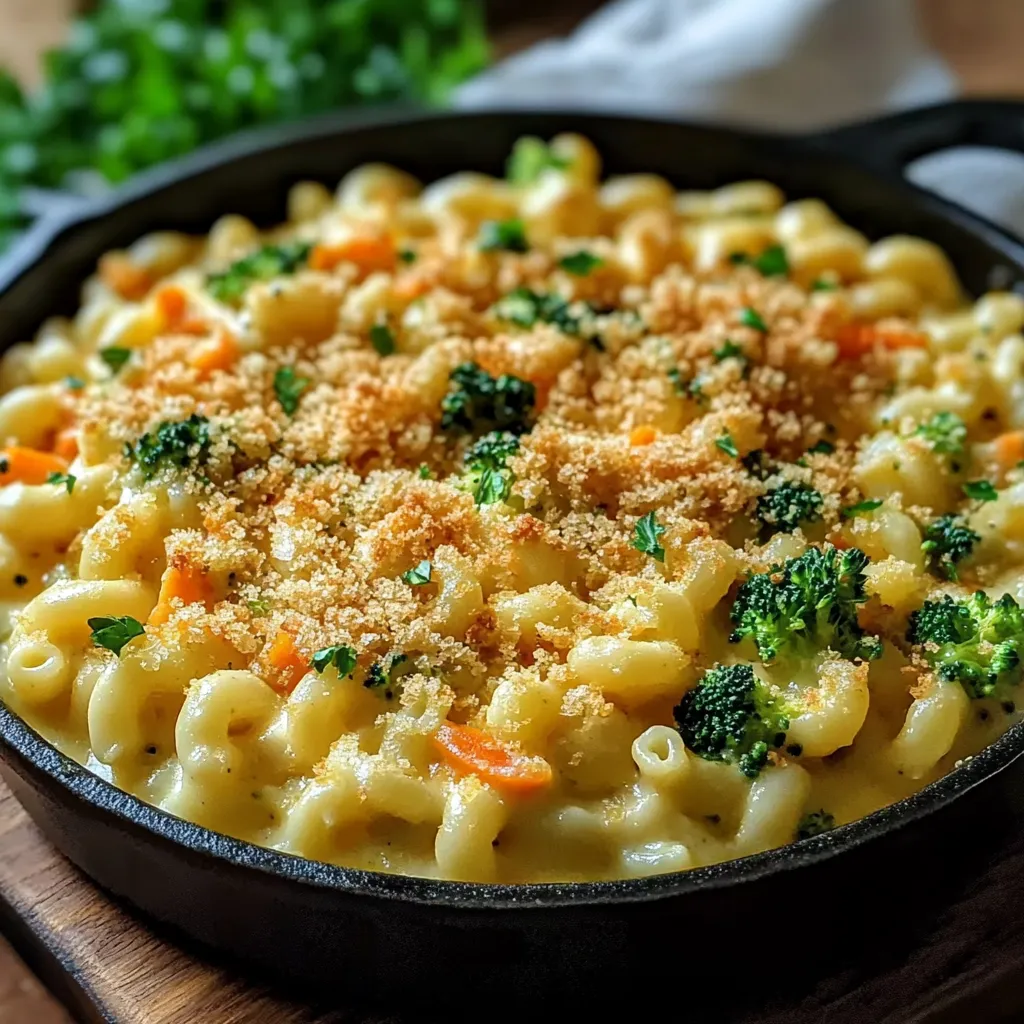 Save
Save
This comforting dish transforms the classic mac and cheese into a nutritional powerhouse by incorporating colorful vegetables without sacrificing that creamy, cheesy goodness everyone craves. The beauty of this recipe lies in its simplicity – everything cooks together in a single pot, allowing the flavors to meld perfectly while minimizing cleanup. The pasta absorbs the cooking liquid, creating a naturally thick sauce without the need for a separate roux or thickening agent.
I discovered this technique during a particularly hectic week when dirty dishes were piling up faster than I could wash them. My daughter, typically suspicious of anything green, devoured two servings without noticing the vegetables hidden within the cheesy sauce. Now it's our Thursday night tradition, with everyone gathered around suggesting which vegetables to include.
Selecting Your Components
- Pasta shapes: Choose small to medium varieties with ridges or holes that capture sauce effectively, such as elbow macaroni, shells, or rotini
- Cheese selection: Sharp cheddar provides classic flavor, while adding parmesan or gruyere introduces complexity and enhanced meltability
- Vegetable options: Finely chopped broccoli, bell peppers, and baby spinach offer color, nutrition, and complementary textures that integrate seamlessly
- Cooking liquid: Vegetable broth adds depth compared to water, infusing the pasta with savory notes as it cooks
The Cooking Method
- Prepare your foundation:
- Heat olive oil in a deep, heavy-bottomed pot over medium heat, then add diced bell peppers and cook until they begin to soften, about 3 minutes.
- Aromatics infusion:
- Add minced garlic and cook just until fragrant, approximately 30 seconds, being careful not to let it brown which would introduce bitterness.
- Pasta introduction:
- Pour in uncooked pasta and stir to coat with oil, slightly toasting it for about 1 minute which enhances its nutty flavor and helps maintain texture.
- Liquid incorporation:
- Add vegetable broth, ensuring pasta is completely submerged, then bring to a gentle boil while stirring occasionally to prevent sticking.
- Vegetable addition:
- When pasta is halfway cooked (about 5 minutes), add chopped broccoli and continue cooking until pasta is almost tender but still slightly firm.
- Final vegetable integration:
- Stir in baby spinach leaves and cook just until wilted, preserving their bright color and nutritional value.
- Cheese transformation:
- Remove from heat and gradually add shredded cheese, stirring constantly until completely melted and sauce becomes smooth and creamy.
- Final adjustments:
- Season with salt, pepper, and a pinch of mustard powder which enhances cheese flavor without tasting mustard-like.
 Save
Save
The first time I made this recipe, I added all vegetables simultaneously, resulting in overcooked broccoli and undercooked carrots. Through experimentation, I learned that staggering additions based on cooking times creates the perfect texture for each ingredient. My husband particularly appreciates how the broccoli maintains its slight crunch, providing textural contrast to the creamy pasta.
Making It Complete
This one-pot wonder offers substantial nutritional benefits beyond convenience. The combination provides complete proteins, complex carbohydrates, and essential micronutrients. Broccoli delivers vitamin C and K, while spinach contributes iron and folate. The cheese provides calcium and protein, creating a well-rounded meal in a single bowl. For parents, this recipe offers peace of mind knowing children are consuming vegetables willingly.
Presentation Possibilities
Elevate your veggie mac and cheese with thoughtful serving approaches. Create individual portions in ramekins topped with extra cheese and breadcrumbs, then broil briefly for restaurant-quality presentation. For casual gatherings, serve directly from the cooking pot alongside a simple green salad dressed with lemon vinaigrette. During cooler months, pair with roasted cherry tomatoes which burst with sweetness, creating delightful contrast against the creamy pasta.
Recipe Adaptations
Transform this versatile base recipe to accommodate various dietary needs and preferences. For protein enhancement, fold in white beans or chickpeas during the final minutes of cooking. Create Mediterranean flair by incorporating sun-dried tomatoes, artichoke hearts, and kalamata olives with feta cheese. Accommodate gluten sensitivities by substituting traditional pasta with brown rice or chickpea varieties, adjusting cooking liquid and time accordingly. These modifications maintain the one-pot simplicity while creating entirely new flavor profiles.
Keeping It Fresh
Properly store leftover veggie mac and cheese in airtight containers for enjoyment throughout the week. When reheating portions, add a splash of milk before warming gently over low heat, stirring frequently to restore creamy consistency. Avoid microwave reheating when possible as it can create uneven hot spots and dry edges. For meal prep convenience, prepare vegetable mixtures ahead of time and refrigerate until ready to cook with pasta. The flavors often deepen overnight, making second-day servings particularly delicious.
This recipe represents everything I love about cooking – simplicity, nutrition, and the ability to bring everyone to the table with enthusiasm. What began as a practical solution has become a beloved staple in our home, proving that convenience and nourishment can coexist beautifully. The joy on faces as everyone digs into vibrant, vegetable-studded mac and cheese confirms that sometimes the most straightforward approaches create the most memorable meals.
 Save
Save
Common Questions About Cooking
- → What vegetables work best in this mac and cheese?
- Almost any vegetables can work! Broccoli, bell peppers, peas, spinach, kale, carrots, and zucchini are all excellent choices. Harder vegetables like carrots should be diced small for quicker cooking. Leafy greens like spinach can be stirred in during the last minute of cooking.
- → Can I make this recipe vegan?
- Absolutely! Use your favorite vegan cheese shreds and make sure to use vegetable broth instead of water for more flavor. Nutritional yeast (1-2 tablespoons) can also be added for an extra cheesy flavor boost.
- → What if my pasta is still too firm but the liquid is almost gone?
- Simply add an extra 1/4 to 1/2 cup of hot water or broth, stir well, and continue cooking for a few more minutes. Different pasta shapes and brands may require slightly different cooking times and liquid amounts.
- → Can I add protein to this dish?
- Yes! For vegetarian options, try adding a can of drained chickpeas, white beans, or cubed tofu. Non-vegetarians might enjoy adding cooked chicken, shrimp, or bacon bits. Add pre-cooked proteins after the pasta is done cooking.
- → How do I prevent the mac and cheese from getting too dry when reheating?
- When reheating leftovers, add a splash of milk, cream, or broth (about 1-2 tablespoons per serving) and stir frequently while warming. This helps restore the creamy texture. Microwaving at medium power rather than high also helps prevent the cheese from separating.
